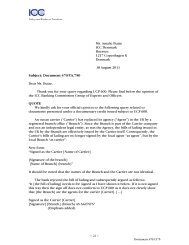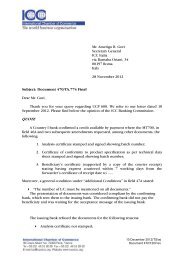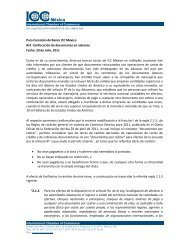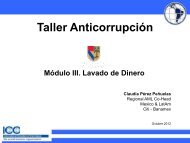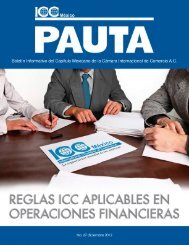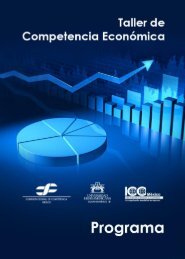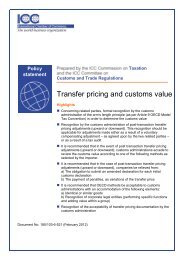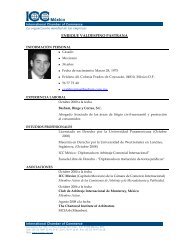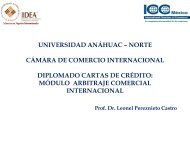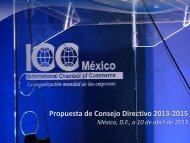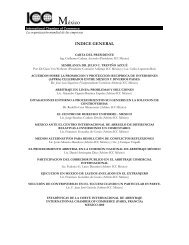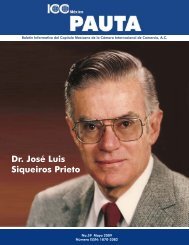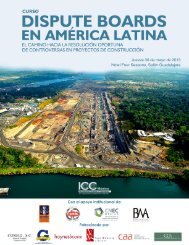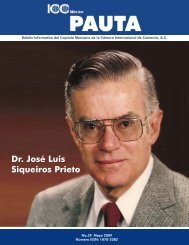Pauta 54.pdf - ICC México
Pauta 54.pdf - ICC México
Pauta 54.pdf - ICC México
- No tags were found...
Create successful ePaper yourself
Turn your PDF publications into a flip-book with our unique Google optimized e-Paper software.
Final Report on ConstructionIndustry Arbittrationsprovide expert knowledge in certain aspects of the dispute, such as programming, quantification orengineering. Sometimes these consultants also appear as the parties’ experts, providing reports and givingevidence at the hearing. These consultants must be distinguished from experts unconnected with the partiessuch as specialists, with a reputation for their expertise in a specific area. However the dividing line is notalways clearly to be seen. The tribunal may have to bear these limits in mind when assessing the weight of theopinions presented to it. For example the tribunal will wish to be sure that any information which a consultantexpert in the former category obtained from a party and which has been used in the formation of his evidenceand opinions has been fully communicated to and known by any other party and the tribunal. The proximity ofsuch an expert to a party may be significant. If the parties wish to present evidence from experts, then afterdiscussion with the parties, the tribunal must also control the ambit of the evidence to see that it is confined to theissues and that it does not deal with matters that are or are capable of being proved in other ways. It ought eitherto draw up the terms of reference of the experts (on the basis of the issues known to it) or to require the parties toagree a statement of the issues and of the facts (both agreed and assumed, e.g. as set out in the witnessstatements) upon which expert evidence is required. If the tribunal does not draw up the experts' terms ofreference the experts should provide the tribunal with their terms of reference or instructions as received from theirclients (subject to privilege) so as to ensure the expert is properly directed and motivated and that the opinions ofthat expert are reliable. The experts, if independent of the parties, acting either as expert witnesses or as technicalconsultants, should discuss their views with each other preferably before preparing their reports, e.g. at a meeting(possibly chaired by the tribunal or, if the parties agree, a designated member) since experts, if truly independent,should eventually agree about most things. Even if there is no such discussion before the reports are presented,one should be held thereafter. Again the tribunal may perform a valuable role in seeing how much convergencemay be found. It may not always be necessary for the parties to be represented at such a meeting (although theyare of course entitled to be represented at any meeting with the tribunal), and there is normally no reason whyany discussion between the experts themselves need be attended by any one else. The tribunal must ensure that itis clear whether or not agreements between the experts bind the parties. If the tribunal were to chair thediscussion it may be difficult for a party to question such an agreement. In any event the reports must be confinedto what is not agreed. Too many reports are burdened with what is already known and accepted and do notconcentrate on the reasons for differing opinions. Reports should be exchanged and if necessary supplementaryreports may be needed.Hearing61. There were interesting divergences between responses. There was general agreement that the tribunal should asearly as possible decide in which order the main issues should be heard and whether certain issues should bedecided in a partial award before other issues were heard. Some suggested that the tribunal should persuade theparties to agree to some issues being decided only on the basis of written submissions and evidence but we thinkthat whilst the tribunal may suggest such a course the parties should be entirely free to decline. The tribunal is notalways best placed to see that some issues have to be the subject of a hearing. However the tribunal shouldalways inform the parties if it thinks that a witness or an expert need not attend the hearing to be questioned. Itshould also require the parties to state whether any witness or expert put forward by the other party is notrequired (in which case the evidence will be accepted subject to a decision as to its value) and to inform thetribunal why a person is required for questioning and the topics to which questioning will be directed. (Here“questioning” covers questioning by a party directly or through the tribunal.)62. We have already covered many steps that will be taken before the hearing. There is general agreement, first, thatall submissions prior to the commencement of a hearing should be in writing and, secondly, that either only anominal time should be allowed at the hearing for opening statements or that there should be no openingstatements. The latter course should however only be taken if the parties agree as many clients wish to hear apresentation of their case. If little or no time is given to opening statements at the outset then, unless the partiesPAUTA 53



